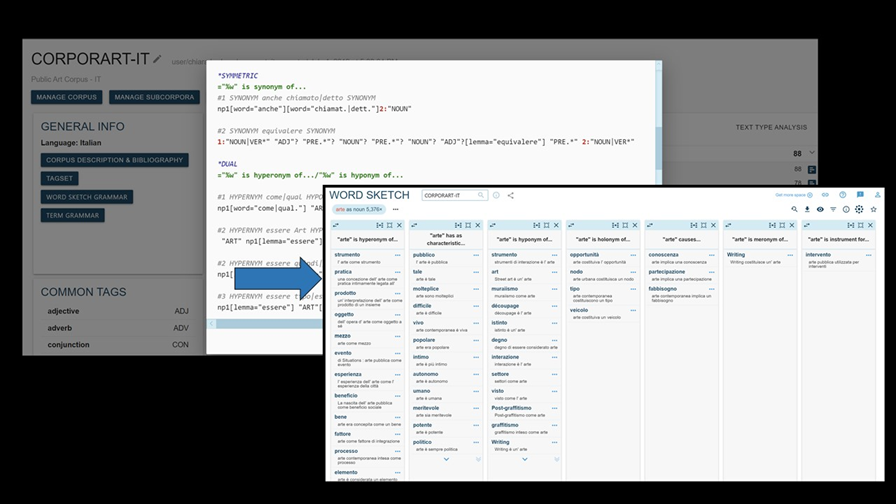CORPORART_GRAMM_IT_1.0
CORPORART Semantic Word Sketch Grammar for Italian – Nouns, verbs and adjectives CQL expressions for semantic relations extraction

Description
The CORPORART_GRAMM_IT_1.0 is a Semantic Word Sketch Grammar for Italian, codified using the Corpus Query Language (CQL) for Sketch Engine, but adaptable to other systems using CQL. The CORPORART_GRAMM_IT_1.0 consists of 24 lexical-syntactic patterns for extracting semantically related items, encompassing various semantic relations, such as hyponymy/hyperonymy, holonymy/meronymy, as well as relations crucial for event description (e.g., agent, result, instrument, location etc.) and adjective description (e.g., characterization).
Usually, Word Sketch Grammars function for collocations extraction and categorization, according to their grammatical relations. The innovative aspect of our CQL Grammar is that it is designed for semantic information retrieval. The CQL grammar operates based on a keyword and, the result is displayed in the form of a Word Sketch. Even though CORPORART_GRAMM_IT_1.0 was initially designed for CORPORART, it can be applied to any Italian corpus.
More on this CQL Grammar
Barbero, C. (2022). CQL Grammars for Lexical and Semantic Information Extraction for Portuguese and Italian. In: Pinheiro, V., et al. Computational Processing of the Portuguese Language. PROPOR 2022. Lecture Notes in Computer Science, vol 13208. Springer, Cham. https://doi.org/10.1007/978-3-030-98305-5_35
Identifier
DOI: https://doi.org/10.34619/0bjc-vhc4
ACCESS
CORPORART_GRAMM_IT_1.0 is freely available according to Open Access policies and you can find it on the Sketch Engine platform.
Authors and Affiliation
CORPORART_GRAMM_IT_1.0 was designed by Chiara Barbero and Raquel Amaro, as part of Chiara Barbero’s PhD program in Linguistics (scholarship: PD/BD/128131/2016). This research was also supported by Portuguese national funding through the FCT – Portuguese Foundation for Science and Technology, I.P. as part of the project UIDB/LIN/03213/2020; 10.54499/UIDB/03213/2020 and UIDP/LIN/03213/2020; 10.54499/UIDP/03213/2020 – Linguistics Research Centre of NOVA University Lisbon.
Menu < back
- Corpora
- Lexicons, Dictionaries, Glossaries
- BDTT-AR – Terminological and Textual Database for the Portuguese Parliament
- Dicionário de Abreviaturas Digitais
- DLP – Portuguese Language Dictionary
- Multilingual Multidomain Dictionary
- DVPM – The Dictionary of Medieval Portuguese Verbs
- COVID-19 Collaborative Glossary
- Multilingual Terminological Glossaries for specific purposes within the Community of Portuguese Language Countries
- Basic terms in speech and language pathology diagnosis
- Ontologies
- Training material
- Other
- BILP – Bibliography of Portuguese Linguistics database
- CORPORART_GRAMM_IT_1.0: CORPORART Semantic Word Sketch Grammar for Italian
- CORPORART_GRAMM_PT_1.0: CORPORART Semantic Word Sketch Grammar for European Portuguese
- Assessment instrument PIPALE 1
- Oneness – On-line less used and less taught language courses
- Scrinium – Medieval Portuguese translations of Latin texts
 PT
PT